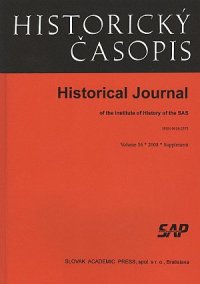Spoločnosť a história – dve stránky jednej mince
Society and history – two sides of the same coin
Author(s): Peter ŠvorcSubject(s): History
Published by: SAV - Slovenská akadémia vied - Historický ústav SAV
Keywords: History; Slovakia; society; historical; knowledge; consciousness; science
Summary/Abstract: History and society are two inseparable elements. One cannot exist without the other. History forms a society, develops and shapes it. This complex and sometimes contradictory process leads to the society attempting to understand itself, its route and its direction. The society creates for this purpose an independent scientific discipline, namely history. The fourteenth congress of the Slovak History Society analysed the way history is fulfilling its role in Slovakia. Various questions were asked and answers to them were sought:The importance for every society of history as a science is clear, but how does this apply in Slovak society? Are we at all aware of this correlation? Is our relationship to our past, our traditions and values, real? Is the relationship to our past only a matter for a handful of intellectu-als, specialists and historians, or is it present in the whole society? What is our historical consciousness? Slovak society gladly accepts the results of the correct work of Slovak historians, most of whom conscientiously add to the mosaic of the rich Slovak past, in spite of various pressures. However, there is another side to the same coin, which shows that there are many problems in the relationship of Slovak society to history: The politicians reach for the results of historical science only sporadically, and only when they need these results for their own purposes. This selective use of history, not only deforms historical knowledge, but also the historical consciousness of society. Slovak society suffers from an absence of historical education, which is inadequate and far from reaching the parameters of the neighbouring countries. Weak historical knowledge is reflected in people’s relationship to the national past. It is rather half-hearted, and not only in the schools, which are short of history textbooks and lessons for teaching history, but also in the institutions, namely archives and museums, which are obliged by law to care for the historical heritage of the country. However, even the historians themselves sometimes succumb to economic and pragmatic pressures. The result is inadequate research and so also bad interpretation of historical events.
Journal: Historický časopis
- Issue Year: 2011
- Issue No: 04
- Page Range: 591-600
- Page Count: 10
- Language: Slovak

